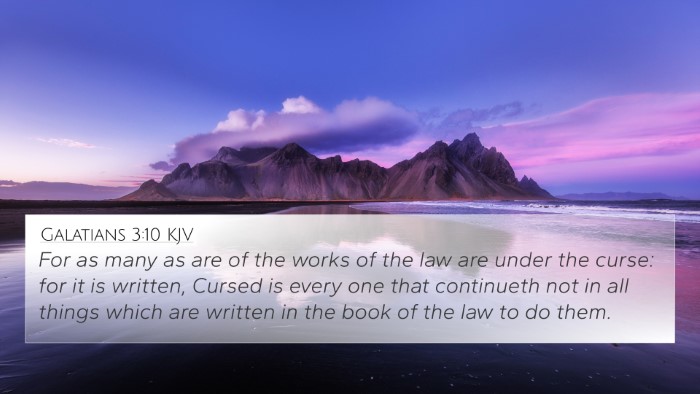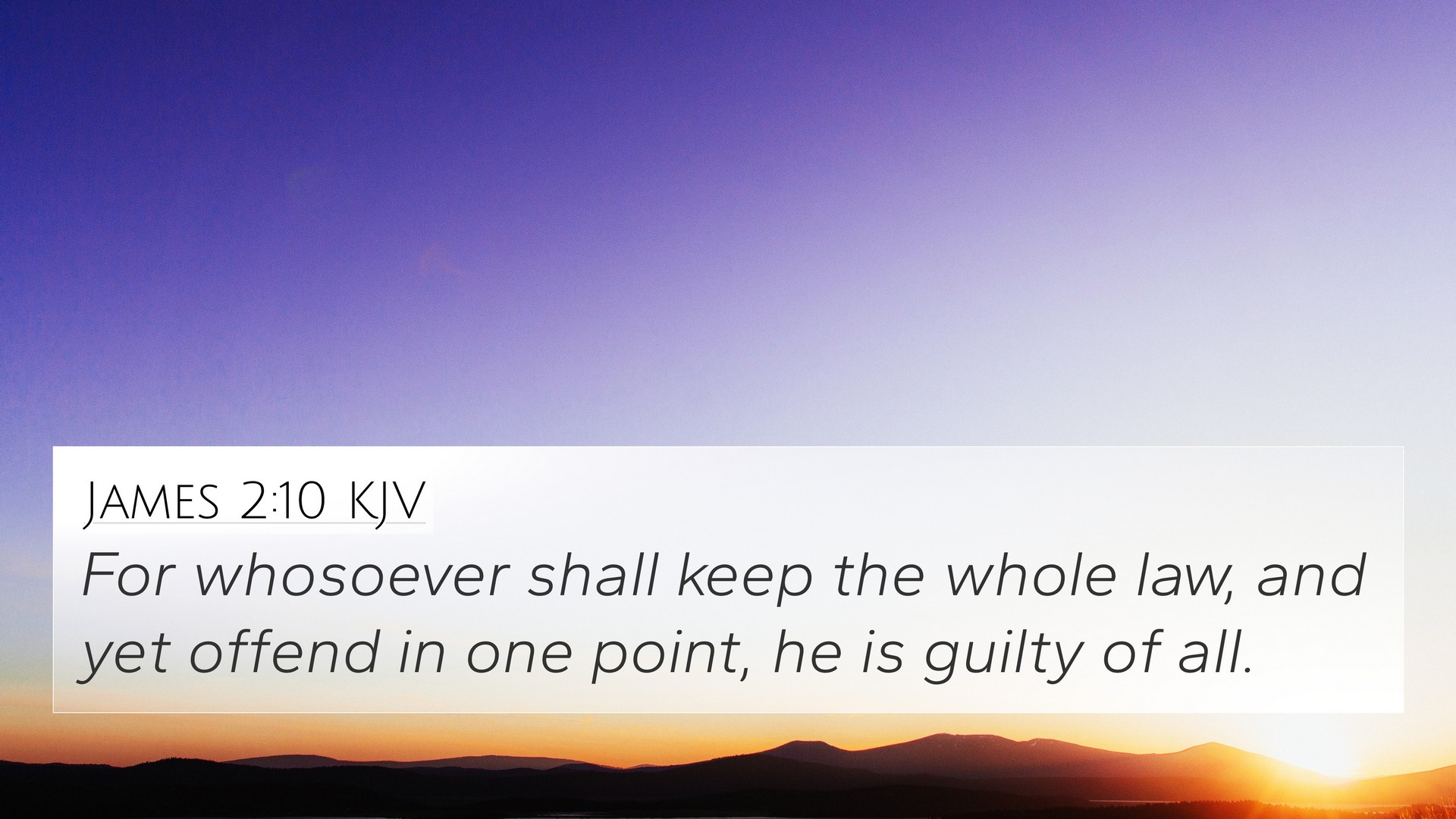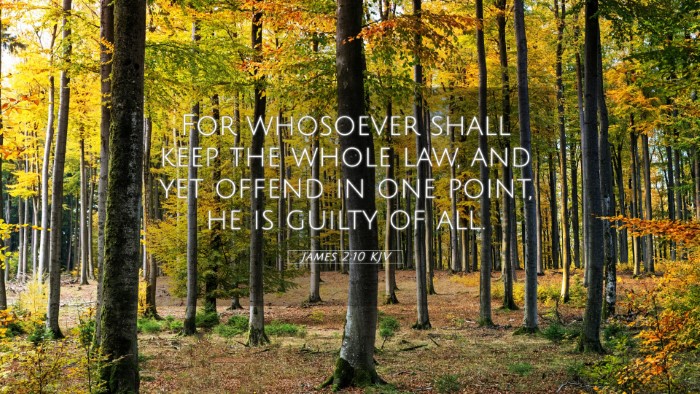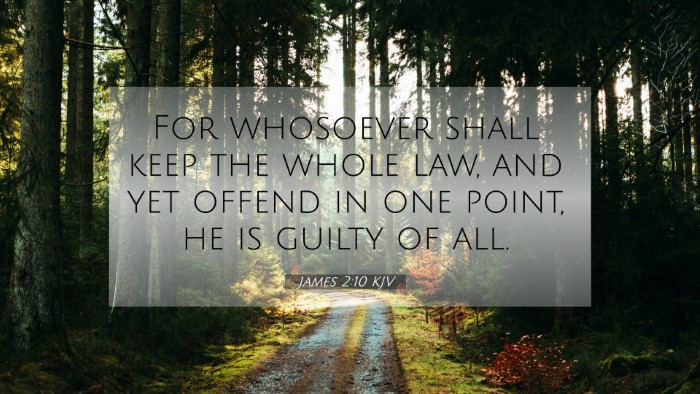Old Testament
Genesis Exodus Leviticus Numbers Deuteronomy Joshua Judges Ruth 1 Samuel 2 Samuel 1 Kings 2 Kings 1 Chronicles 2 Chronicles Ezra Nehemiah Esther Job Psalms Proverbs Ecclesiastes Song of Solomon Isaiah Jeremiah Lamentations Ezekiel Daniel Hosea Joel Amos Obadiah Jonah Micah Nahum Habakkuk Zephaniah Haggai Zechariah MalachiJames 2:10 Similar Verses
James 2:10 Cross References
For whosoever shall keep the whole law, and yet offend in one point, he is guilty of all.
Uncover the Rich Themes and Topics of This Bible Verse
Listed below are the Bible themes associated with James 2:10. We invite you to explore each theme to gain deeper insights into the Scriptures.
James 2:10 Cross Reference Verses
This section features a detailed cross-reference designed to enrich your understanding of the Scriptures. Below, you will find carefully selected verses that echo the themes and teachings related to James 2:10 KJV. Click on any image to explore detailed analyses of related Bible verses and uncover deeper theological insights.

Galatians 3:10 (KJV) »
For as many as are of the works of the law are under the curse: for it is written, Cursed is every one that continueth not in all things which are written in the book of the law to do them.

Matthew 5:18 (KJV) »
For verily I say unto you, Till heaven and earth pass, one jot or one tittle shall in no wise pass from the law, till all be fulfilled.

Deuteronomy 27:26 (KJV) »
Cursed be he that confirmeth not all the words of this law to do them. And all the people shall say, Amen.
James 2:10 Verse Analysis and Similar Verses
Understanding James 2:10
James 2:10 states: "For whosoever shall keep the whole law, and yet offend in one point, he is guilty of all."
Summary of Meaning
This verse emphasizes the idea that the law is a unified whole and that breaking any part of it renders one guilty of violating the entire law. The apostle James stresses the importance of not only the outward observance of the law but also the inward intentions and commitments behind it. The verse serves as a sobering reminder of human fallibility and the need for mercy and grace in the face of God's standards.
Insights from Public Domain Commentaries
-
Matthew Henry:
Matthew Henry comments on the serious nature of sin, highlighting that even minor offenses are substantial enough to render one guilty before God. He posits that the law requires perfection, thus underscoring the impossibility of achieving righteousness through works alone.
-
Albert Barnes:
Albert Barnes elaborates on the implications of this verse by noting that it reveals the folly of any attempts to rely on human merits for justification. He states that it communicates the total dependency on Christ's atoning work for salvation, emphasizing grace rather than law.
-
Adam Clarke:
Adam Clarke reflects on the nature of divine law, stating that the law, when violated, exposes the sinner to the just consequences of their actions. He asserts that this verse indicates the severity of transgression and the necessity of seeking repentance and divine forgiveness.
Cross-References of James 2:10
-
Galatians 3:10:
This verse similarly emphasizes that those who are under the law are cursed if they do not continue in all things written in the law to perform them.
-
Romans 3:23:
For all have sinned and come short of the glory of God, affirms the universal nature of sinfulness and the inability to meet God's standards perfectly.
-
Romans 7:7-8:
Paul illustrates the purpose of the law and how it reveals sin, echoing the idea that violation in any point leads to guilt.
-
1 John 1:8:
If we say that we have no sin, we deceive ourselves, indicating the necessity of recognizing our flaws and dependence on Christ’s grace.
-
Matthew 5:19:
Jesus’ teaching that those who disobey the least of the commandments will be considered least in the kingdom speaks to the principle of the seriousness of law obedience.
-
James 4:17:
Knowing to do good and not doing it is sin, reinforcing the comprehensive nature of accountability under God’s law.
-
Hebrews 10:26-27:
Highlights the consequence of deliberate sin after receiving the knowledge of the truth, pointing towards the seriousness of falling short of God’s requirements.
-
Matthew 22:37-40:
Jesus summarizes the Law and the Prophets in loving God and neighbor, underscoring the importance of internal motivation to the law.
-
Luke 16:17:
Acknowledges that it is easier for heaven and earth to pass than for one tittle of the law to fail, stressing the law's permanence and relevance.
-
Philippians 3:6:
Paul discusses his past as a Pharisee, emphasizing that reliance on legalism is futile compared to the faith in Christ for true righteousness.
Thematic Bible Verse Connections
James 2:10 connects to broader themes of sin, grace, and the nature of the law throughout Scripture. The verse serves as a pivotal point for discussions around human inability to fulfill the law and the necessity of divine grace. These themes resonate strongly between the Old and New Testaments, revealing a unified message of hope despite human failure.
Conclusion
In summary, James 2:10 serves not merely as a statement about the law's demands, but also as a profound reminder of the need for humility and reliance on God's grace, which is indispensable for salvation. Understanding this verse through the lens of additional cross-references provides a richer insight into its deeper theological implications.


